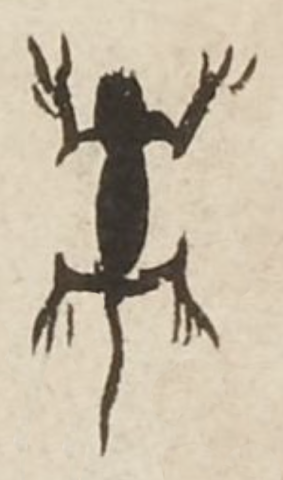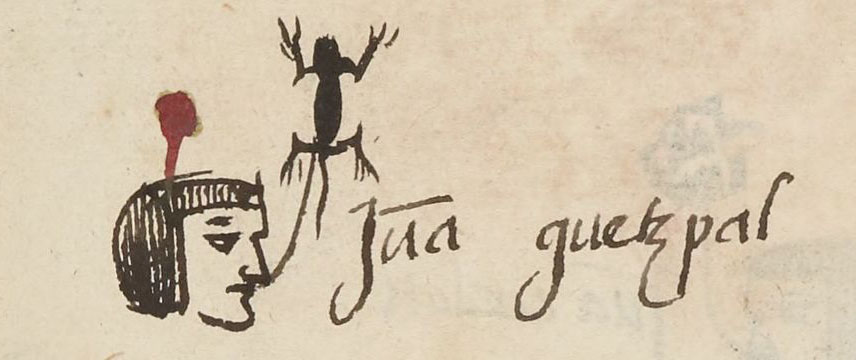Cuetzpal (MH486r)
This black-line drawing of a simplex glyph for the name Cuetzpal ("Lizard") doubles as the noun for cuetzpalin, the reptile. The animal is seen from a bird's eye view. It is heading upward, as though climbing a wall. It is painted completely black.
Stephanie Wood
This is a day sign in the Mesoamerican calendar, and calendrics figured prominently in Nahuas' religious views of the cosmos. So, a person such as this man, Diego Cuetzpal, with a baptismal first name, may have been born on a day with this name. Gordon Whittaker (personal communication, April 2023) suggests that Quetzpal may be a dialectical variant for Cuetzpal. In the Matrícula de Huexotzinco, there are variations in the feet of the animal, sometimes having prominent toes, and sometimes not. Other manuscripts have turquoise-colored lizards, and the one in the Codex Magliabechiano has a protruding red tongue. This one may be painted black as a way of providing a clue to the name ending in -pal, which is short for the color black, and therefore may be serving as a phonetic indicator.
Stephanie Wood
Juā guetzpal
Juan Cuetzpal
Stephanie Wood
1560
Jose Aguayo-Barragan
lizards, lagartos, reptiles

Cuetzpal, a name https://nahuatl.wired-humanities.org/content/cuetzpal.
Quetzpal, a name of a historical personage, https://nahuatl.wired-humanities.org/content/Quetzpal
cuetzpal(in), lizard, https://nahuatl.wired-humanities.org/content/cuetzpalin
pal(li), black clay or the color black, https://nahuatl.wired-humanities.org/content/palli
El Lagarto
Stephanie Wood
Matrícula de Huexotzinco, folio 483r, World Digital Library. https://www.loc.gov/resource/gdcwdl.wdl_15282/?sp=51&st=image
This manuscript is hosted by the Library of Congress and the World Digital Library; used here with the Creative Commons, “Attribution-NonCommercial-ShareAlike 3.0 License” (CC-BY-NC-SAq 3.0).


